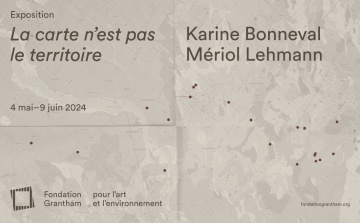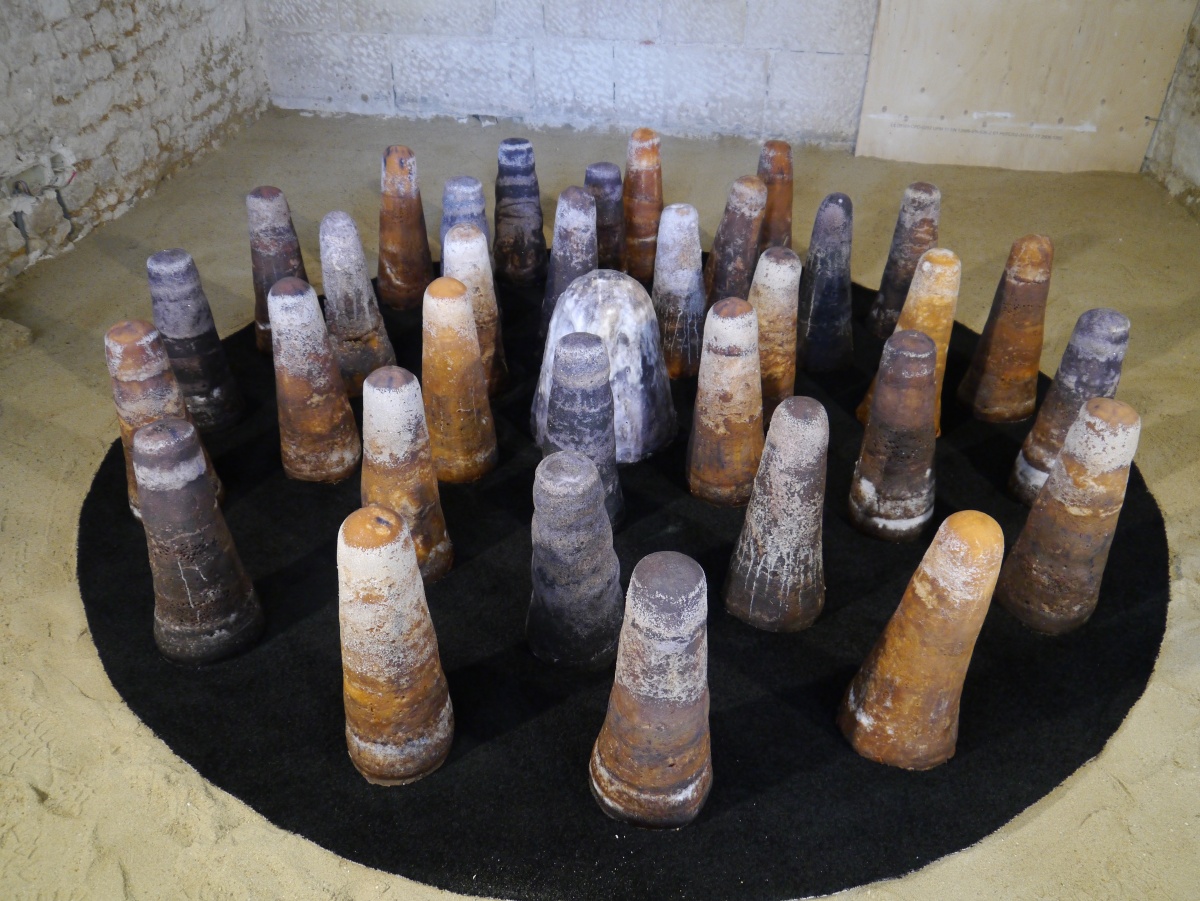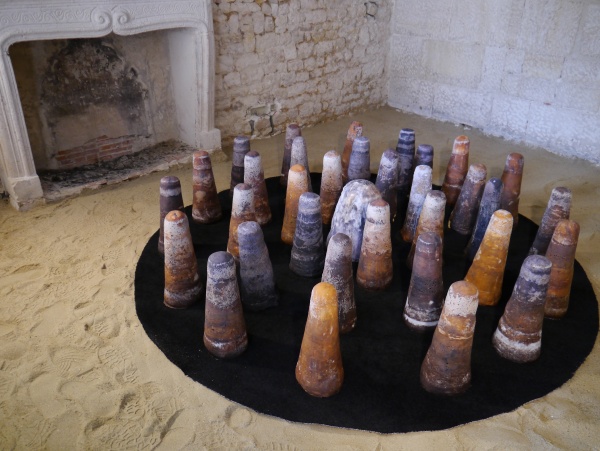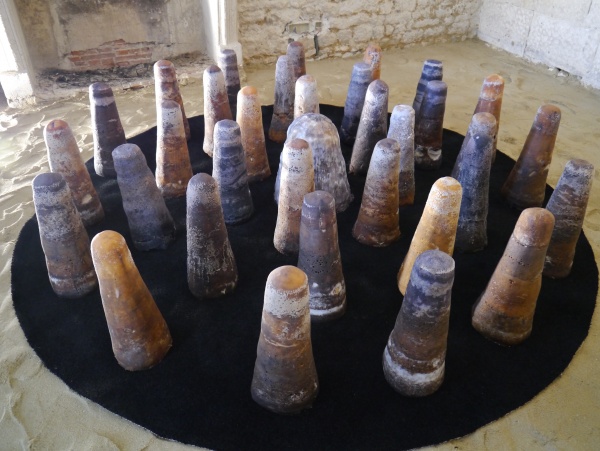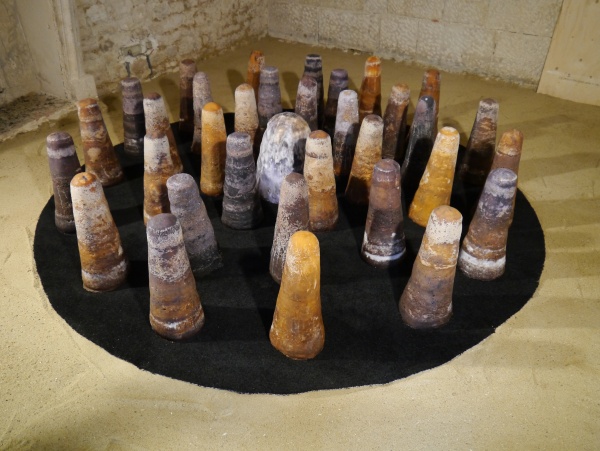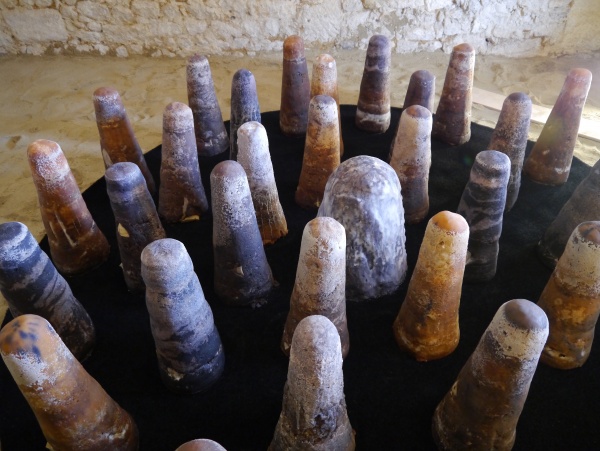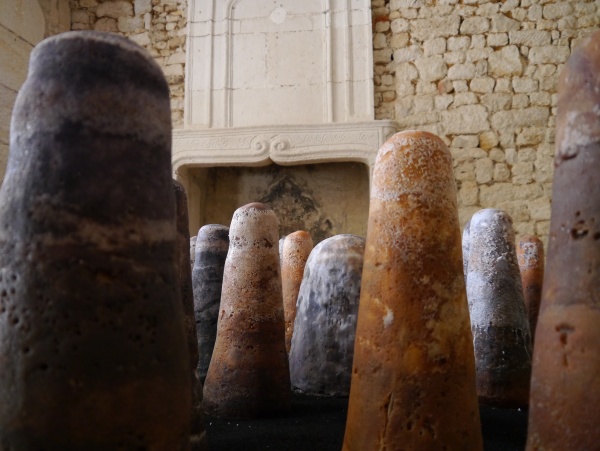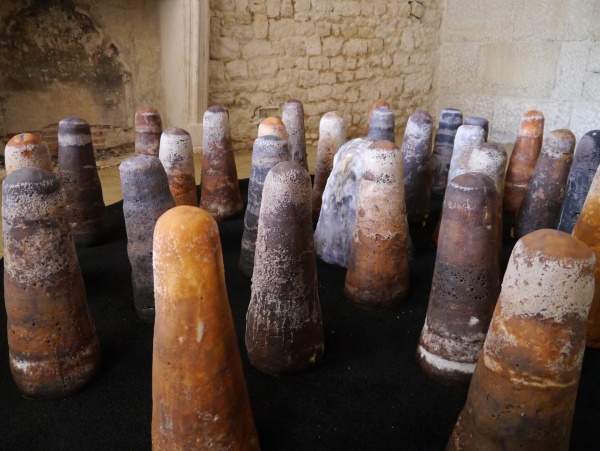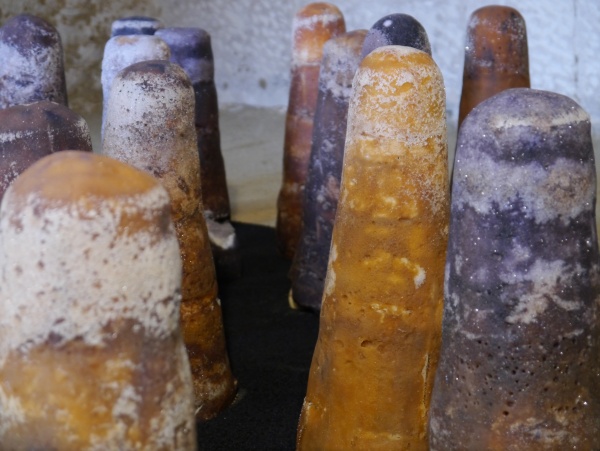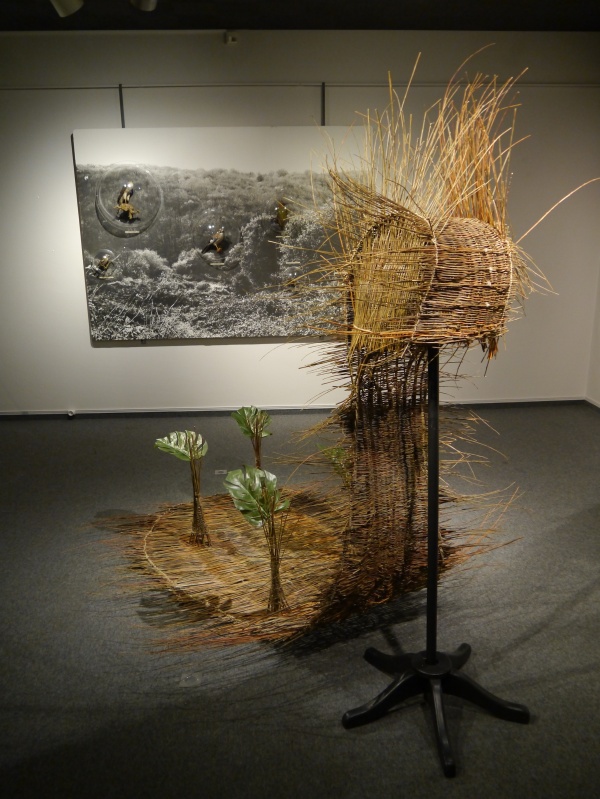Pass me the salt!
From July 6th to September 27th 2013 Fontenay-le-Comte contemporary art journey, diverse locationsParcours contemporain, Fontenay le Comte, curated by Juliette Cortes
With Magali Babin, Marc Bretillot, Karine Bonneval, Michel Lebrun Franzaroli, Florentine Guedon, Pauline Horovitz, Aurélie Mathigot, texts by Gilles Fumey.
Trivial yet essential: food connects us to the earth and to each other. How can we fail to be amazed by the magic of this process that transforms fruit, vegetables, meat, fish and chocolate bars into blood, lymph, flesh, energy and intelligence?
The explorers' outfits are behaviourist sculptures that present themselves as camouflage shells for exploring the most common 'natural' areas, i.e. a landscape transformed and exploited by man. Mirroring a history of man's view of nature, these ironic outfits are to be seen from the naive point of view of those who believe themselves to be untouched by environmental cultural influences.
Juliette Cortes, 2013, catalogue passe-moi le sel !
Where does what we eat come from?
We look at nature as a curiosity, especially the birds that hide in the harvest. We hunt it down, play with it and use it as a larder.
For millions of years, man has been deciphering his environment and what it has to offer. Often, they are afraid of it and want to dominate it. And the backlash is sure to follow.
Gilles Fumey, 2013, catalogue passe-moi le sel !
Makarka is Reunionese Creole for unrefined sugar. "Dirty sugar" is a word that tells a dirty story.
Totemic, menacing, oozing, swollen and crusty, the sugar loaves that rise up from this black circle form a kind of archaeological mandala, a place of worship in an abandoned room. Black, glittery sugar made from the recipe for failed caramel exerts both fascination and disgust.
A volcanic landscape: plant turned mineral, mummified, petrified, this ensemble is like a set for a Negro version of Hansel and Gretel: one that incorporates slavery, mistreatment and despoilment. Fontenay-le-Comte, halfway between Nantes and La Rochelle, has seen the results of the sugar wars. What is essential does not come from nothing.
Juliette Cortes, 2013, catalogue passe-moi le sel !
Sugar is our pleasure and one of humanity's worst plagues. Human beings love sugar. We've been frantically searching for it since prehistoric times. Alexander, conqueror of Greece, brought sugar cane back from India, which he acclimatised in the Mediterranean before the colonists cultivated it in the West Indies. With the complicity of African chiefs, they introduced the worst form of slavery. Napoleon ruined the triangular trade that had so enriched Nantes and Bordeaux by encouraging Delessert to develop sugar beet. But the wound of slavery took another half-century to heal.
Today, we eat too much sugar and diabetes is one of mankind's most dreaded diseases. We need to be wary of sugar.
Gilles Fumey, 2013, catalogue passe-moi le sel !
Mobile gardens. Documentary footage was shot in Berry and Guyana on two market gardening sites cultivated by representatives of the Hmong ethnic group. Fictional scenes are integrated into this: they retrace the wanderings of two half-man, half-plant characters, symbolising adaptation.
These Wilder-männer make the transition from a pristine natural site to a cultivated one. Their almost shamanic profile evokes the work of acclimatising vegetables and fruit to unsuitable territories. The magical nature of the figure gives it the power to sow the seeds of the places it crosses and transform the land.
In Aubigny-sur-Nère, the vegetables grown are ingredients in traditional Hmong cuisine, and the exotic nature of the crops contrasts so sharply with the local environment that the geographical location of the gardens is a mystery.
At Javouhey, the sites border on primary forest, which is always ready to reclaim its rights over the vegetables. Whatever the sites chosen, the precision and beauty of the gardening gestures are always astonishingly delicate.
Continuing their journey, each Wilder -mann takes to the river or the forest, the cross migration of man and plant continuing.
Juliette Cortes, 2013, catalogue passe-moi le sel !
Gardens are our passion for the earth. It's a dream of paradise that all orangeries dreamt of when the fashion for Versailles reached the richest châteaux. Gardens are the fruit of hard work and, above all a passion and fascination for living things. A cycle of life and death that repeats itself from season to season. Karine Bonneval pays tribute to this through the Hmong community, Laotians who came from the plateaux of South-East Asia as part of a humanitarian operation led by France in the 1970s. The Hmong were welcomed in the Centre region and in French Guiana.
Fruit and vegetables have been selected for millennia along the banks of rivers and forests. Javouhey is a Burgundian name. It's the name of a woman who went to French Guiana as a nun to help convicts get back on their feet. On the banks of the majestic Mana River, she planted her convent and gardens in total symbiosis with the forest. Every vegetable is born of water and earth.
Aubigny-sur-Nère, in Sologne, is in the same water-earth proximity. Here, work is carried out to the rhythm of the river. Time is needed to understand what will come to us in the kitchens.
The side-by-side videos show the interchangeable nature of nature, breaking down the idea of terroir, which turns out to be an archaic myth of an earth that provides for man's needs. What we call 'roots' are an imaginary way of linking us to this land that we don't need a lifetime to understand what it can give us.Karine Bonneval likes the idea that people and food products move from one cultural area to another. How are they received? Cultivated? What kind of cuisine are they preparing for tomorrow, now that the tropical is acclimatising to the temperate?
We take a closer look at these two areas of ongoing globalisation, where nothing seems to stand in the way.
Gilles Fumey, 2013, catalogue passe-moi le sel !
